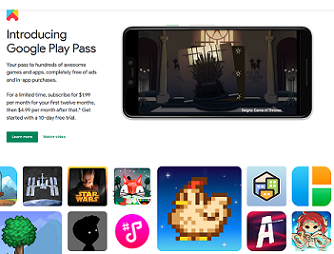Yesterday, Google launched their response to Apple Arcade: Google Play Pass. You can read about both services in the primer we published. Google Play Pass is a godsend for Android gamers, but it looks like a bad deal for mobile game developers, at least for now. Let’s dive into why Google Play Pass is currently set up to pay developers in a bad way.
Subscription Services and Money
Gaming subscription services have been popping up everywhere over the last few years, with some of the heavy hitters including Xbox Game Pass, PS Now, and EA Access.
Game Pass has been particularly popular with developers, as the advertising associated with showing up on the Game Pass dashboard has been credited with increasing exposure. Game Pass is also good for games that have DLC or microtransactions, as someone playing a game for free on Game Pass is (obviously) more likely to spend money on DLC or microtransactions than someone who never played the game at all. Most importantly, it is believed that Microsoft pays developers up front to put their games on Game Pass, so it’s an excellent deal for developers of games that are not making a ton of money.
Google Play Pass Pays Developers Based on the Amount of Time People Spend in their Apps
According to Google, developers whose apps are in Play Pass are paid by engagement, specifically by how much time users spend in their apps.

This is the first major subscription service to pay developers like this, as most subscription services so far are believed to pay upfront, and it’s a very bad thing.
The obsession with engagement has led to all of the worst parts of mobile gaming, including daily and weekly check-ins, limited events, and poorly designed game modes. Think about it: the average free-to-play mobile game doesn’t necessarily want you to have fun on your time, it wants you to have a limited amount of fun every single day, which is why they incentivize you to check in every day but restrict your energy/lives to a few minutes of playtime a day. Anything that encourages even more of this engagement-driven design is a negative.
Another issue is that games in Google Play Pass can’t make money with in-app purchases. This is great for consumers, since it gives us more bang for our buck, but it cuts off a revenue stream for developers. A game in Xbox Game Pass can still make money by having subscribers buy DLC and microtransactions, but a game on Google Play Pass can’t do the same as of now. This is bad for developers, but good for consumers. This might be an okay trade-off on its own merits, but it’s unacceptable for the future of game design when combined with the fact that developers are not paid up front and are instead paid based on engagement. It would be easier for developers to accept that they could not make money through in-app purchases if they were paid up front.
Google Can Still Change Their Model
In the quote shown in the screenshot above, Google made sure to specify that they’re “continuously refining the model to make sure it fairly rewards titles that bring the highest user value”. In other words, nothing is set in stone, and the model could change tomorrow for all we know. The wording indicates that they’re not likely to move away from their current model that’s based on playtime, but you never know. In other words, if we make enough noise as consumers, they might actually change this. Strangers things have happened, right?
At the end of the day, Google Play Pass is an exciting deal for mobile gamers with Android phones, but it’s a rotten deal for mobile game developers. This could especially be a problem if other subscription services follow Google’s lead, instead of following Microsoft, Sony, Apple, and EA. We can only hope that Google changes their model to support developers in a better way.


